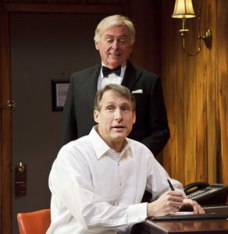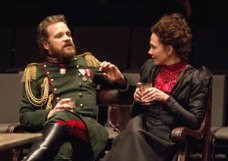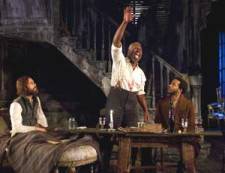Review: Interviewing the Audience
Feb 17th
 Everybody has a story, but some are more interesting than others. So you take your chances with Zach Helm’s Interviewing the Audience, currently at the Vineyard Theatre. Based on a concept created by the late Spalding Gray, this theater piece is akin to tuning in to a random episode of Dr. Phil.
Everybody has a story, but some are more interesting than others. So you take your chances with Zach Helm’s Interviewing the Audience, currently at the Vineyard Theatre. Based on a concept created by the late Spalding Gray, this theater piece is akin to tuning in to a random episode of Dr. Phil.
In this theatrical exercise, Helm--the screenwriter of Stranger Than Fiction and Mr. Magorium’s Wonder Emporium (he also directed the latter)—randomly selects audience members and brings them onstage for impromptu chats. Since every performance will be entirely different, the results are inevitably varied.
At the show caught, the subjects included a pathologically shy 16-year-old who confessed to seeing a therapist for her social anxiety; a Brazilian college student visiting the U.S.A.; and an older woman who talked at length about her relationship with her daughter living in Colorado.
The unassuming Helm, who thankfully takes no for an answer should you choose to decline his invitation—“We have a lot of voyeurs here tonight,” he commented upon seeing the large number of hands raised by those who didn’t wish to participate—takes an almost therapeutic approach to his gentle interrogations. Unlike Gray, who added a layer of irony to his questioning, he projects an attitude of sincere caring.
He begins each talk with the same question, “How is it that you came to be at the theater?” After that, he wings it, although he frequently finds interest in articles of clothes the person is wearing. In the case of the withdrawn teen, who came to the stage wearing a wolf’s head hat, complete with ears, that nearly covered her entire face, it provided plenty of fodder for conversation.
There is certainly something gripping about people suddenly opening up about their lives in front of a large group of strangers, and the solicitude expressed by Helm was frequently touching. He adds a personal level to the proceedings by frequently revealing intimate details about his own life.
Since none of the three women at the performance caught were particularly interesting or articulate—the Brazilian warned up front that her English language skills were lacking—the results were somewhat less than compelling. But in a spontaneous atmosphere such as this, lightning is bound to strike, so your experience may be far different. As much social experiment as it is theater, Interviewing the Audience is a slight but undeniably fascinating experience.
Vineyard Theatre, 108 E. 15th St. 212-353-0303. Through Feb. 27.
Review: Black Tie
Feb 11th

Few playwrights have covered a particular social milieu as exhaustively and effectively as A.R. Gurney. For decades now, he has been steadily producing comedies dealing with the social mores of the WASP set, with often sublime results (The Dining Room, The Cocktail Hour). His latest effort, Black Tie, being given its world premiere by Primary Stages, is a decidedly lesser, more trivial entry in his increasingly growing canon. But thanks to some typically sharp comedic writing and a well-acted production expertly staged by Mark Lamos, it is nonetheless often amusing.
The primary dilemma facing father of the groom Curtis (Gregg Edelman) is the choice of attire for his son’s impending nuptials. He wants to wear the vintage tuxedo passed down by his late father, but the idea seems rather silly since the decidedly casual affair is taking place at a well-worn, rustic hotel in the Adirondacks (perfectly depicted in John Arnone’s detailed set).
Just as he’s trying on the newly tailored duds and nervously contemplating the speech he’s due to give at the rehearsal dinner, who should appear but the dearly departed father himself (Daniel Davis). As Curtis interacts with his exasperated wife Mimi (Carolyn McCormick), his sassy teen-age daughter Elsie (Elvy Yost) and his anxious son Teddy (Ari Brand), his father, unseen and unheard by everyone but Curtis, hovers over the proceedings, offering his own old-fashioned, bemused take on things.
Although the situations the playwright has devised often border on silliness—for instance, a mini-crisis erupts when the bride’s old boyfriend, now an in-your-face stand-up comic, threatens to hijack the dinner by performing his entire act—the play offers enough incisively observed commentary on the culture clash between the younger and older generations and amusing one-liners to compensate for the hoary plot schematics.
The lead actors play their roles to perfection. Edelman hits just the right notes as the beleaguered father; the perfectly cast McCormick is both elegant and funny as the exasperated wife; and Davis is wonderfully droll as the spectral figure who insists that his son is not donning a tuxedo but rather a “dinner jacket.”
59E. 59 Theaters, 59 E. 59th St. 212-279-4200. www.primarystages.org.
Review: Three Sisters
Feb 9th

For all their staying power over the years, the plays of Anton Chekhov are remarkably fragile works in performance. It’s so rare that all the elements come together--that all of the performers work in synch, that the directorial tone is cohesive—that more often than not contemporary productions are a trial to sit through.
The Classic Stage Company’s revival of Three Sisters is a case in point. Although it contains many admirable elements, including several worthwhile performances and a striking set design, it never coheres into a satisfying whole. There are stirring moments, but the general unevenness is ultimately defeating.
Director Austin Pendleton, who staged a 2009 production of Uncle Vanya at the same theater, has reunited several of its cast members for this effort, most notably the starry married duo of Maggie Gyllenhaal and Peter Sarsgaard.
The titular siblings so famously longing to return to Moscow are played here by Gyllenhall as Masha, trapped in a loveless marriage; Jessica Hecht as Olga, the spinster schoolteacher; and Juliet Rylance as the idealistic youngest sister, Irina.
The supporting cast is no less impressive. Besides Sarsgaard as the military officer who becomes the object of Masha’s ill-fated obsession, there are Josh Hamilton as the sisters’ unhappy brother Andrey; Marin Ireland as Natasha, his shrewish wife; and Paul Lazar as Masha’s much older husband. Smaller roles are filled out by such theater veterans as Roberta Maxwell, George Morfogen and Louis Zorich.
As with the Vanya, Gyllenhaal and Sarsgaard are again the weakest links here, delivering listless performances that rarely delve beneath the surface. Faring much better are Hecht, who infuses Olga with a poetic intensity, and Rylance, utterly radiant.
The supporting turns are similarly uneven. Hamilton is quite moving as the forlorn brother, for instance, while the wildly gesticulating Ireland seems in another, far more modern, play entirely.
Paul Schmidt’s translation, while undeniably accessible, is also problematic, filled with jarring slang that feels inappropriate for the period.
Kudos, however, to set designer Walt Spangler, who use the CSC’s awkward space to excellent effect. The playing area is dominated by a massive dining table fully ornamented for a lavish feast, providing an apropos visual correlative to the sisters’ regimented lives. When the table is lifted via pulleys to provide an open space for the final act set in a courtyard, it feels positively liberating.
Classic Stage Company, 136 E. 13th St. 212-352-3101. www.classicstage.org.
Review: Gruesome Playground Injuries
Feb 8th

If the title of Rajiv Joseph’s new play Gruesome Playground Injuries isn’t off-putting enough, what transpires onstage certainly is. This dark comedy about two friends who compare the all-too-visible scars from various physical traumas over the course of many years might have worked as an outrageous one-act. But drawn out to a full-length evening it becomes the theatrical equivalent of rubbernecking at a highway car crash.
The playwright--whose Pulitzer-Prize nominated Bengal Tiger at the Baghdad Zoo, soon to arrive on Broadway, is apparently far more substantial—does display a facility for dark humor in this two-character work about Kayleen (Jennifer Carpenter) and Doug (Pablo Schreiber), who first meet in their parochial school infirmary. The ensuing vignettes depict their equally ill-fated encounters over the ensuing years, in which the clearly foolhardy Doug has, among other things, blown out one of his eyes with a firecracker and been hit by lightning, while the troubled Kaylee has developed a propensity for self-mutilation.
With little besides the results of these horrific incidents on display, the characters emerge as little more than cipher-like devices fueling the evening’s nasty humor. The detached, clinical nature of the proceedings is further accentuated by Neil Patel’s antiseptic set design--resembling a hospital room and including several rows of audience members onstage as if observers at an operating theater--and by the decision to have the actors doing their costume and make-up changes in full view.
The performers do what they can with their schematic roles, with Carpenter, in particular, displaying the sort of edge charisma edginess that she uses to such fine effect on TV’s Dexter. But their efforts are not enough to overcome this deliberately provocative but ultimately shallow exercise.
Second Stage Theatre, 305 W. 43rd St. 212-246-4422. www.2st.com.
Review: The Whipping Man
Feb 7th

It’s easy to see why Matthew Lopez’s play The Whipping Man has enjoyed considerable success on the regional theater circuit. Set during the final days of the Civil War and concerning an impromptu Passover Seder conducted by a pair of black slaves and their former owner, it seems cannily designed to appeal to both African-American and Jewish audiences.
Unfortunately, the play, now receiving its New York premiere courtesy of the Manhattan Theatre Club, is less interesting than its premise. Tedious and plodding for most of its running time, it relies on a sensationalistic early scene and some melodramatic revelations towards the end for dramatic effect.
Set in a ruined antebellum mansion in Richmond, Virginia, it depicts the fateful encounter among three figures: Caleb (Jay Wilkison), the Jewish soldier who has limped back to his home with a grave injury to his leg; and Simon (Andre Bruagher) and John (Andre Holland), his family’s former slaves who have been converted to their faith.
Determining that Caleb is suffering from gangrene, Simon decides that his leg must be removed, resulting in a grisly, vividly staged amputation scene that will certainly have audiences cringing.
Not too much happens after that, with the characters engaging in windy, philosophical discussions about the horrors of the war and the issues for which it was fought. A conflict arises between Simon, who has returned to the home to safeguard the family’s possessions, and John, who has resorted to thievery and is using the house to store his booty.
The two slaves, with Caleb’s reluctant agreement, decide to hold a Seder, which provides a neatly dramatic parallel between the plight of the Jewish slaves in Egypt and their 19th century black contemporaries.
There are few dramatic fireworks until shortly before the play’s conclusion, when Simon learns shattering information about his family that propels him to action.
Atmospherically staged by Doug Hughes and featuring a gorgeously dilapidated set designed by John Lee Beatty and moodily lit by Ben Stanton, the production does feature compelling performances, especially by the ever-reliable Braugher, who brings complex shadings to his role as the conflicted ex-slave. But for all its thematic ambition, this historical drama never comes to dramatic life.
City Center Stage I, 131 W. 55th St. 212-581-1212. www.nycitycenter.org.